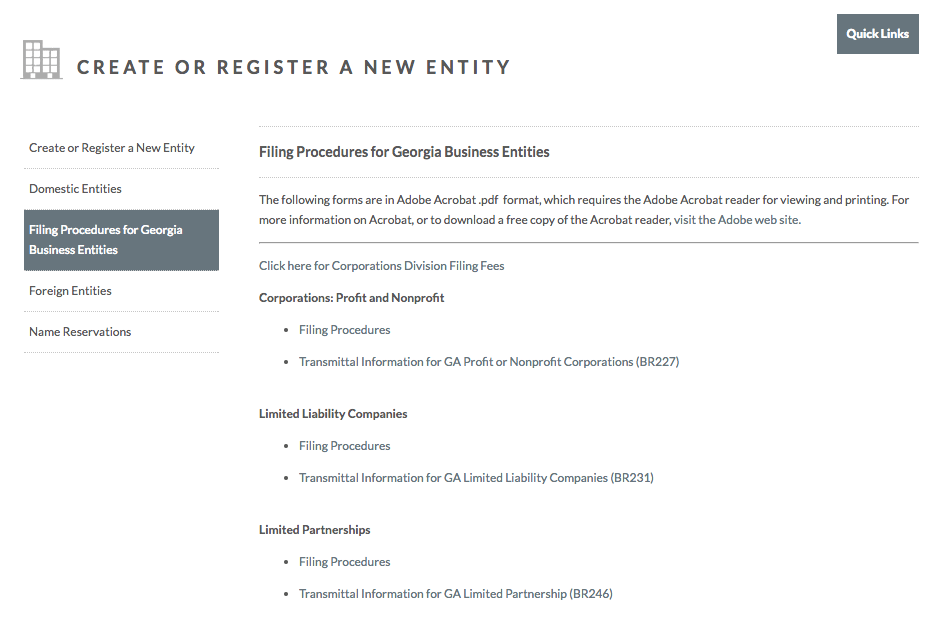In the United States, there are approximately 543,000 businesses established each month. While there are a lot of factors that play into the decision to become a business owner such as budget, location, where to seek funding, and a host of others; one of the most important is choosing a legal business structure through incorporation. There are a lot of options, and new business owners have a lot to consider in deciding which path to take in registering their business.
A Brief Summary of Incorporation Types
Walking into the small business registration process with knowledge of the incorporation type you are considering makes everything go a lot more smoothly. To get started on the decision-making process, here are a few of the most popular incorporation types and their general functions.
Sole Proprietorship – This type is the simplest to form, and it is used by more than 70 percent of businesses. If a person conducts business activities but does not incorporate, they are already recognized as this type. A sole proprietorship does not separate individuals from a business entity, so a person can be held liable for debts and obligations of the business.
Partnership – This type is split into two categories: limited partnership and limited liability partnerships. For a limited partnership, one person has unlimited liability, and everyone else retains limited liability. A limited liability partnership is where the responsibility of all owners is limited.
Corporation – Like partnerships, corporations are typically divided into two types: C corps and S corps. C corps is a legal entity that is treated as separate from its owners. It makes a profit, can be taxed and held liable for debts and obligations like a person. S Corps are similar to C Corps, and their primary purpose is to prevent double taxation that impacts C Corps.
B Corps – This incorporation type is taxed the same as a corporation, but their purpose is to further a mission or public benefit in addition to making a profit.
Limited Liability Company (LLC) – This type is a blend of corporations and partnership types. Individuals who use this designation do not experience corporate taxes, and it limits individuals and their assets from personal liability.

How Can You Choose the Best One for Your Startup?
Each business type has advantages and disadvantages, and it takes intentional research to decide the one that works best for your startup. Below are five questions you should ask yourself when making a final selection:
How much risk and liability am I willing to incur?
Since you are interacting with customers in a lot of different ways, the probability of a lawsuit is a lot more likely. Therefore, it is crucial to determine the amount of risk you can handle. In a sole proprietorship and limited partnership, if there is a lawsuit or an outstanding debt, the personal assets of owners are up for grabs. There is a tradeoff of control and flexibility with the risk that new business owners have to consider.
What level of control am I comfortable with?
Much of this has to do with the eventual evolution of the company. It is likely that a new company, regardless of its designation, will allow founders to have a lot of control over how it operates. However, if a business designated as a corporation grows, the board of directors will have a more significant say in company goings-on while sole proprietorships and limited liability companies allow owners to retain complete control.
Which incorporation types are the most complex?
If you are on your own and handling a lot of the paperwork and administrative duties associated with registering your business alone, then it is essential to understand which types involve the most legwork and have a lot of steps that might be difficult to understand. Anything that only includes one or two people participating in ownership will be a lot easier to work through than a C or S corp. Also, certain business entities require permits at state, local, and federal levels, so it is crucial to be aware of any particular steps where this should take place to know if an accountant or lawyer is required.
What is the purpose of the business?
This is one of the most important questions a new business owner can ask. The overall goals, objectives, and purpose of the business play a vital role in the small business registration process. When registering your business, you need to think about if the company has a social responsibility edge to it, or if the goal is hopefully to go public one day. Also, if you are looking to expand your business to employ a large number of people or to lean on a board of directors for support, these preferences will significantly inform your decision. It will likely be between businesses that allow owners to have sole control or ones where governance is more decentralized.
How do I want to be taxed?
Yourself or your business will be taxed according to the type of structure your business is registered under. A sole proprietorship requires owners to pay personal income taxes for net business profits, while an LLC prevents double taxation. Knowing which structures will give you the best taxation scenario is key to early financial management.
There are a lot of factors to think about when registering your business and selecting an incorporation type. However, the main thing all new business owners should consider in the small business registration process is how it will contribute to overall success.
Read other articles on Small Business Start-up
Sources:
Choose a business structure, www.sba.gov/business-guide/launch/choose-business-structure-types-chart
Benefits and Drawbacks of Different Types of Business Entities, smallbusiness.findlaw.com/incorporation-and-legal-structures/benefits-and-drawbacks-of-different-types-of-business-entities.html
How to Choose the Best Legal Structure for Your Business, www.businessnewsdaily.com/8163-choose-legal-business-structure.html
Business Structure: How to Choose the Right One for You, www.nerdwallet.com/blog/small-business/business-structure/






